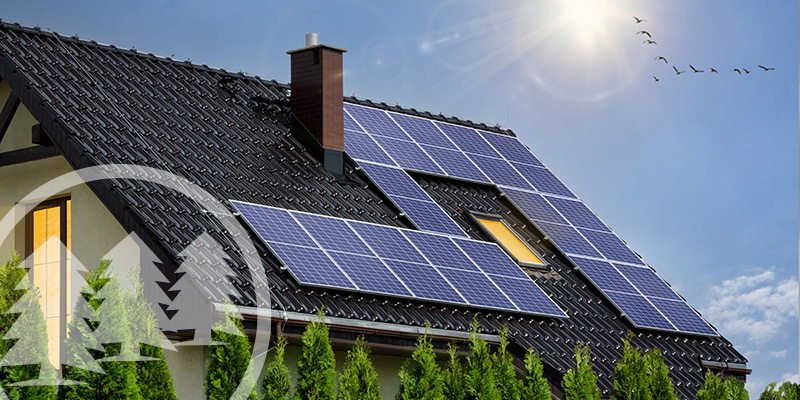Homeowners associations are known to restrict certain architectural modifications in communities. But, does this authority extend to prohibiting a North Carolina solar in HOA communities?
What Is the North Carolina Solar Access Law?
In 2007, North Carolina drafted and passed its first solar access law. Known as SB670, the law prohibited an HOA’s CC&Rs from banning “the reasonable use of a solar collector for a detached single-family residence.” The law on North Carolina solar in HOA communities only applies to HOAs formed after 2007.
While this law was a good first step toward protecting the solar rights of homeowners, it didn’t prevent associations from controlling where owners could install their solar panels. Essentially, HOAs don’t have the ability to deny requests to install North Carolina solar in HOA communities, but they can block homeowners from installing them on a roof that faces the street or public — even if such a placement allows for maximum sun exposure.
The North Carolina solar in HOA law is not unique in that other states have similar solar access laws in place. For instance, the Solar Rights Act in California offers similar protections, prohibiting HOAs from banning solar panel installations. Solar access laws also exist in Arizona, Texas, and Florida. While these laws prevent an association from enacting rules that disallow solar panels, HOAs generally retain the ability to restrict their placement. Additionally, many HOAs require homeowners to go through a detailed application and approval process.
The Fight Against North Carolina HOA Solar Panel Restrictions
 Living in a community managed by an HOA means having to abide by its rules. These rules can range from pet policies and noise rules to parking rules and maintenance requirements. In terms of architectural changes, HOAs have policies for those, too.
Living in a community managed by an HOA means having to abide by its rules. These rules can range from pet policies and noise rules to parking rules and maintenance requirements. In terms of architectural changes, HOAs have policies for those, too.
Homeowners associations typically have a set of architectural guidelines that all members must follow. These guidelines could consist of rules pertaining to paint color, the height of fences, the size of a shed, etc. But, it can also include rules about solar panels.
Many homeowners associations restrict the installation of solar panels because of how they look. They usually don’t conform to the aesthetic of the neighborhood. And with over 14,000 HOAs in North Carolina alone, that means there are millions of potential solar homeowners not getting the full advantage of these solar panels.
The problem has become so prevalent that several solar advocate organizations have sprouted. The North Carolina Sustainable Energy Association (NCSEA) is one of the most prominent ones fighting to change HOA solar restrictions and supporting bills that protect the right of homeowners to access solar energy. The NCSEA has also been known to empower and assist homeowners in negotiating with their associations.
Additionally, many solar energy companies have established dedicated departments designed to help homeowners seek HOA approval. These departments assist with completing application forms, providing necessary blueprints, and supplying other supporting documents. Because of HOA solar restrictions, companies lose up to hundreds of would-be solar owners every year.
Even with the North Carolina HOA solar installation law in place, though, conflicts still occurred. Homeowners found themselves at war with their HOAs when it comes to installing solar panels. Again, it all boils down to HOAs regulating the placement of solar panels, which could interfere with their effectiveness in collecting solar energy.
Belmont v. Farwig: A Pivotal Ruling
Tom Farwig set out to install solar panels on his rooftop with the help of Blue Raven Solar, a solar energy company based in Utah with operations in North Carolina. His HOA, Belmont Community Association, responded by fining the homeowner (which he consistently paid) and subsequently suing him. Farwig countersued, asserting that the HOA violated the North Carolina solar access law since solar panels weren’t expressly prohibited in the rules. The HOA, though, argued that solar panels fall under “improvements,” which is covered in the community’s rules.
The North Carolina Court of Appeals ruled in favor of Belmont. However, clean energy advocates, the rooftop solar industry, and even North Carolina’s attorney general have all filed briefs supporting Farwig. The case was elevated to the North Carolina Supreme Court, which came to a resolution. They reversed the decision of the Court of Appeals.
According to the NC Supreme Court, homeowners retain the right to install solar panels on their property even if the HOA opposes it. State law now explicitly protects the rights of homeowners who want to install solar panels regardless of their location of residence. While HOAs are still allowed to designate where homeowners can install their solar panels, HOAs cannot move panels to areas that hinder their reasonable use.
Diving Deeper
 Blue Raven Solar, much like many solar energy companies, does not typically install solar panels without HOA approval. But, due to a mistake, the company installed the solar panels without getting approval from Belmont. Five months later, the HOA requested an application from Farwig, and Blue Raven Solar supplied it. The permit even included the signatures of 22 other residents of Belmont who supported the solar panel installation.
Blue Raven Solar, much like many solar energy companies, does not typically install solar panels without HOA approval. But, due to a mistake, the company installed the solar panels without getting approval from Belmont. Five months later, the HOA requested an application from Farwig, and Blue Raven Solar supplied it. The permit even included the signatures of 22 other residents of Belmont who supported the solar panel installation.
Belmont, though, rejected the permit multiple times. The HOA argued that the panels would not be aesthetically pleasing when seen from the public street. Farwig ended up paying $52,000 in fines, which Blue Raven Solar intends to reimburse along with Farwig’s attorney’s fees should the homeowner lose the case.
According to North Carolina’s solar access law, HOAs can’t explicitly or effectively ban solar. The only way they can prohibit front-facing solar panels is if the language in its rules expressly prohibits them. Homeowners associations can amend their declaration to include such a provision, but it would require a two-thirds vote from homeowners.
What The Ruling Means for Homeowners
The ruling will not only have an impact on homeowners but also homeowners associations. It removes a significant obstacle to homeowners who want to go solar. Moreover, it allows potential clients to proceed with their solar panel projects should they wish to switch to renewable energy.
In addition, homeowners associations will no longer be able to force homeowners to install their solar panels in places where they cannot be used, such as the back of the home. An HOA’s architectural review committee (ARC) cannot limit solar panel location that would prevent its reasonable use due to roof orientation. The court also maintained that HOA provisions that grant the board discretionary authority to ARCs cannot be used to ban solar panels.
Nearly 26% of North Carolina homeowners live in an HOA. Millions of people’s lives have been affected by this decision. Originally, the HOA had complete authority over where these homeowners could install solar panels on their homes — but, not anymore. Homeowners in North Carolina can now have more confidence that their decision to go solar will not be arbitrarily denied.
However, while the Supreme Court’s decision will certainly affect HOAs from here on out, solar companies and environmentalists believe it is not enough. The legislation will have a more prominent and long-lasting effect.
How to Ask Your HOA for Permission
Thanks to the ruling, North Carolina solar in HOA communities are not as restricted. Homeowners can talk to their homeowners association about potential installations. Here are some ways you can go about asking your HOA for permission.
1. Get a Feel for the HOA’s Stance
Firstly, homeowners can around the neighborhood and find out who the HOA board members are. They can talk to the board members and gauge whether or not they’re for or against solar panels in the community. This will help the homeowner get a feel for whether or not they’ll run into potential opposition.
2. Petition for Solar Panels
If the HOA isn’t for solar energy, homeowners can petition for it within their community. Consider changing their minds by discussing the benefits of solar panels and how they can increase property value. Moreover, solar panel offers a great way to cut down on costs and provide electricity during storms and power outages.
Furthermore, homeowners can ask other pro-solar community members to sign a petition. This should draw the HOA’s attention to the issue and let them know the community’s thoughts and opinions. Over time, the HOA could change its restrictive covenants on solar panels.
3. Use the Law
Homeowners can use the North Carolina solar access law and the NC Supreme Court’s ruling to convince their HOA board members. The board should be more open to installations once they’re made aware of the ruling. However, be prepared because the HOA can still restrict where you can install solar panels as long as it doesn’t interfere with reasonable use.
4. Ask for Help
As a last resort, homeowners can ask professional solar installers to help them proceed and fight their HOA. These professional installers are familiar with state law and can help residents navigate HOA restrictions.
The Future of North Carolina Solar in HOA Legislation
While the NC Supreme Court ruling has certainly broken barriers, homeowners argue that the law can still improve to protect the rights of homeowners. More specifically, they want to limit an association’s ability to dictate panel placement, especially when it comes to street-facing solar panels. They want to prevent HOAs from moving solar panels to areas that could cause at least a 10% drop in productivity.
House Bill 842 intended to protect these homeowner rights, but it died in the Senate. There may be hope for its reintroduction or refiling in the future, but only time will tell. Homeowners continue to hope that lawmakers will establish a percentage that’s considered “reasonable use” of their solar panels. This would mean that solar installations need to perform at a set percentage to be considered “practical.” Such a law could prevent HOAs from relocating panels to certain locations that limit energy production.
North Carolina Solar in HOA Communities: An Important Decision
The long-standing battle between homeowners and HOA solar restrictions will see an important development once the state’s Supreme Court makes its decision. Until then, homeowners associations must examine their restrictions on North Carolina solar in HOA communities to determine what needs to change.
Navigating an HOA’s governing documents can come as a challenge to inexperienced board members. Get help from Cedar Management Group by calling (877) 252-3327 or contacting us online.
RELATED ARTICLES:
- Your Guide To North Carolina HOA Laws
- South Carolina HOA Laws
- House Bill 320: New Virtual Meeting Law For North Carolina HOAs






